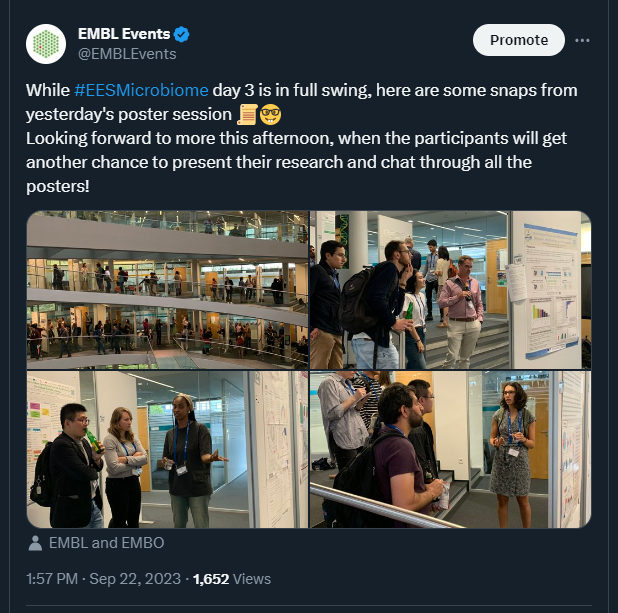Best poster prizes at ‘The human microbiome’
The EMBO | EMBL Symposium ‘The human microbiome‘ took place last month, bringing together experts to discuss the newest findings about the human microbiome and its connection to healthfulness and disease. The scientists presented their latest research and techniques to study the human microbiome, explored factors that influence the human microbiome and the association of diseases with specific human microbial signatures, and discussed how the human microbiome can be used as therapeutic target to treat disease.
This time, we had 408 people attending on site (and 109 virtually), including 15 fellowships provided by the EMBL Corporate Partnership Programme and EMBO. We held two poster sessions up on the helices of the Advanced Training Centre during which the presenters could discuss their research – their work was then voted for by other attendees and speakers. Three best poster prizes have been awarded during the meeting and we are pleased to share with you two of them!
Predicted drug metabolism of human gut microbes
Presenter: Ángela Del Castillo Izquierdo
Collaborator: Angel Ruiz-Moreno

University Medical Center Groningen,
The Netherlands
Abstract:
The role of the gut microbiota in drug metabolism is emerging, potentially altering drug bioavailability, efficacy and toxicity. Although several large scale in vitro drug microbe culture experiments have shown that hundreds of orally administrated drugs can undergo drug microbe interactions; little is known about the metabolising capabilities of drugs by the human gut microbiota. Especially most downstream drug metabolites from bacterial biotransformation remain unknown.
In this study, we applied the newly developed MicrobeRX tool to predict drug biotransformation of human-targeted drugs. This tool employs more than 300 K chemically specific reaction rules from 40 K biotransformations reported in human and 7,302 intestinal microbial strains. By applying this tool to 1,083 orally administered drugs from the DrugBank database, we obtained 4,617 highly confident metabolic predictions. Among them, microbiome-derived novel downstream products were predicted for 347 drugs. Interestingly, our results indicate that bacterial drug metabolism can be either chemo or phyla and strain-specific. For example, our predictions suggest that 3 hydroxysteroid dehydrogenase (3 HSD) in gut bacteria could metabolise 21 hydroxysteroidal drugs and that cephalosporin C acetylhydrolase (CAH) could metabolise a wide range of cephalosporin antibiotics.
We further aim to validate in silico drug metabolism predictions in vitro. To date, we have access to 1,941 bacterial isolates from human faecal samples. After co-culture bacterial isolates with drugs, we will use LC MS/MS to identify and quantify the drugs and resulting metabolic products from bacterial biotransformations. The bacterial enzymes responsible for these biotransformations will be isolated via recombinant protein expression and studied along with the drugs. Finally, we will study the biological significance and context of drug metabolism in the human gut microbiota using RNA sequencing, and their downstream effect in human host using human-based liver on a chip model.
View poster (please note, parts have been greyed out due to the confidentiality of the unpublished data)
Poster prize kindly supported by FEBS Letters
Lyophilized faecal microbiota capsules for clinical research
Presenter: Koen Wortelboer

Abstract:
Background and Aim
The intestinal microbiota have been implicated in metabolic disorders, such as the metabolic syndrome and non-alcoholic fatty liver disease (NAFLD), as well as autoimmune diseases like type 1 diabetes mellitus (T1DM). Faecal microbiota transplantation (FMT) has shown promising results in improving disease phenotype by altering the microbiota composition without serious side effects. However, FMT via colonoscopy or nasoduodenal tube is an invasive, time-consuming procedure causing patient discomfort. Therefore, we developed capsules containing lyophilized faecal microbiota (LFM), which can be easily self-administered and enable at home maintenance treatment.
Methods and Results
We first optimized the lyophilization and encapsulation processes of the faecal suspension. The best results were obtained by lyophilizing the frozen suspension for 48 hours at -80°C, using a lyoprotectant combination of trehalose 10% and maltodextrin 5%. Using aerobic and anaerobic culturing methods and flow cytometry, we observed a slight decrease in bacterial viability during preparation of the LFM capsules. This decrease was especially manifest after freeze-drying and encapsulation, although within expectations. Next, we performed a stability study showing that the faecal bacteria in LFM capsules were stable during storage in the freezer for at least twelve months. Finally, to protect the bacteria from gastric acid, we compared different capsules using dissolution tests. Enprotect® capsules provided the best protection, although there was a reduction in viable bacteria compared to baseline.
Conclusion and Future Steps
We have successfully developed LFM capsules with reasonable viability, stability and protection against gastric acid. These capsules are currently being utilized in two clinical studies. The first study involves a proof of concept in T1DM patients who will ingest one autologous LFM capsule daily for three months. The second study is a randomized, placebo-controlled clinical trial in NAFLD patients who will take two LFM capsules from a healthy vegan donor daily for six months, complemented with three loading doses of 21 LFM capsules every two months.
Due to the confidentiality of the unpublished data, we cannot share the poster.

Find out more about the #EESMicrobiome meeting from the blog post written by Aditya Malwe, who participated as an event reporter!
The EMBO | EMBL Symposium ‘The human microbiome’ took place from 20 – 23 September 2023 at EMBL Heidelberg and virtually.